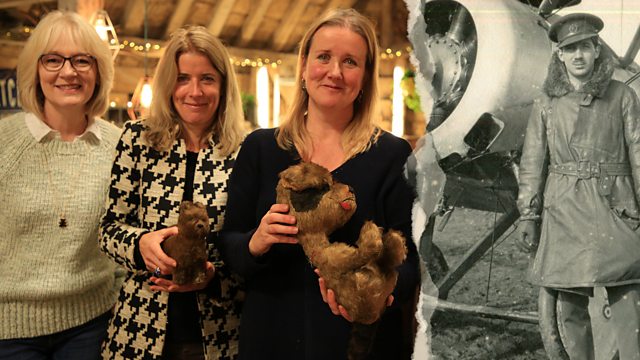
Episode 10
Jay Blades explores the legacy of the First World War in the UK by delving deeper into three restorations: some bagpipes, a soldier鈥檚 wire cutters and two RAF mascots.
Jay Blades delves deeper into the restoration of three amazing family heirlooms that survived the First World War.
The first item is a pair of wire cutters brought in by David Broome. They were previously owned by his grandfather, who fought as a soldier at the Battle of the Somme in 1916. During an attack, he was hit by a bomb and blown onto some barbed wire. He awoke to see a dead German lying next to him. Fortunately, the late soldier鈥檚 wire cutters were in reach, allowing David鈥檚 grandfather to cut himself free and walk to safety. Jay uses archive to show how the typical Tommy was kitted out during World War I and how infantry kitbags have changed since then. He also looks into the history of barbed wire and how it came into military use, particularly in No Man鈥檚 Land during battles like the Somme.
Next is a set of bagpipes that belonged to a bagpiper with the Royal Scots regiment during the First World War. Jay tell the heroic story of Scottish bagpipers, who were frequently the first out of the trenches, leading troops over the top during attacks. Unarmed and playing their pipes, they were sitting ducks for enemy fire, but continued to march resolutely on despite the dangers. He brings their story up to date with their role in the modern day royal household.
Last but by no means least are a pair of mascots owned by sisters Susie and Kasha. Their grandfather, Oswald, was a pioneering reconnaissance pilot for the newly formed Royal Flying Corps during the First World War, flying dangerous missions over enemy lines to photograph German positions in order to help guide British artillery attacks. Like many pilots, he owned mascots, in this case two teddies. Jay explains how brave pilots like Oswald pioneered a whole new way of fighting that still exists to this day, as well as tracing the early development of the modern RAF.
Last on
More episodes
Previous
Next
Music Played
Timings (where shown) are from the start of the programme in hours and minutes
-
![]() 00:32
00:32Anders Niska, Klas Wahl
A Day At The Time
Credits
| Role | Contributor |
|---|---|
| Presenter | Jay Blades |
| Series Producer | Paula Fasht |
| Executive Producer | David Sayer |
| Executive Producer | Rob Butterfield |
| Executive Producer | Emma Walsh |
| Production Company | Ricochet Limited |

